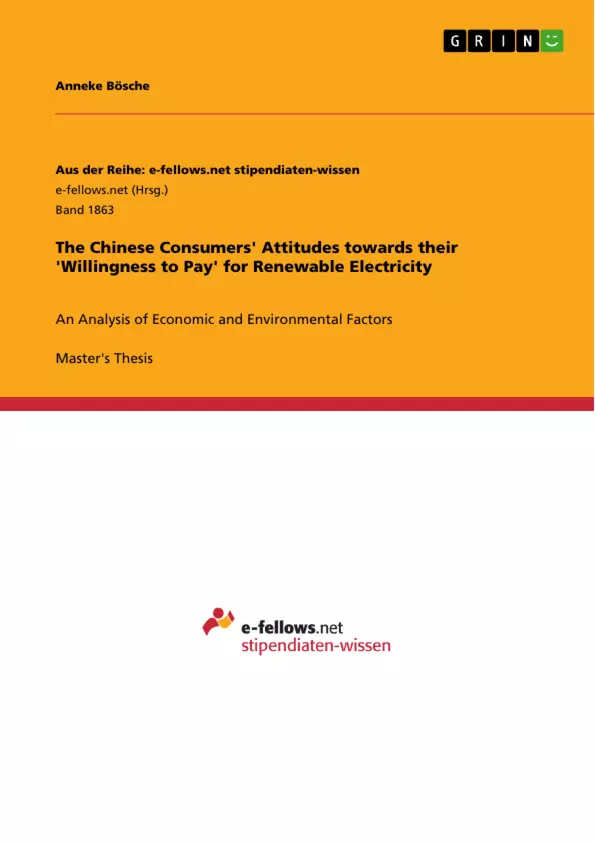China’s economic development has not only led to enormous growth figures, but also to a severe degradation of the environment. Mass-consumption of fossil fuels like oil and coal in China contributed to reaching the level of the largest greenhouse gas emitter worldwide. For the Chinese government to react, it is crucial to take the electricity purchase decisions of households into account to successfully implement energy policies. Hereby, a Chinese social survey shall help to show the effects of economic and environmental factors on the consumers’ willingness to pay for the adoption of green electricity: the results of both a Linear Probability Model and a Probit model indicate that environmental factors do not play a crucial role when it comes to the consumers’ willingness to pay for higher prices/taxes in order to protect the environment – whereas the economic factor regarding the influence of price levels has a slightly more effective impact. Nonetheless, education and adequate information provision about the merits of green electricity seem to be a prerequisite in order to promote the purchase of renewable electricity.
Inhaltsverzeichnis (Table of Contents)
- 1. Introduction
- 2. Previous Research
- 2.1 Overview of China's energy situation
- 2.2 Government policies
- 2.2.1 The renewable energy policy in China
- 2.2.2 The Green Electricity Scheme in Shanghai
- 2.3 Evidence from other countries
- 2.4 Development of factors influencing WTP
- 2.4.1 Income of Chinese residents
- 2.4.2 The price of electricity
- 2.4.3 Government support policies
- 2.4.4 Environmental conditions
- 3. Hypotheses
- 4. Methodology
- 4.1 Methodology
- 4.2 Data description
- 4.3 The econometric model
- 4.3.1 Dependent variables
- 4.3.2 Independent variables
- 4.3.3 Control variables
- 4.3.4 Descriptive statistics
- 5. Model testing
- 6. Results
- 7. Robustness check
- 8. Discussion
Zielsetzung und Themenschwerpunkte (Objectives and Key Themes)
This paper aims to investigate the Chinese consumers' willingness to pay for renewable electricity, analyzing the influence of economic and environmental factors on their purchase decisions. By examining the impact of these factors, the study seeks to understand the social acceptance of green electricity in China and identify potential obstacles or drivers for its adoption.
- The impact of economic factors on consumers' willingness to pay for green electricity
- The role of environmental factors in influencing consumer preferences for renewable energy
- The significance of education and information provision in promoting the purchase of green electricity
- The relationship between consumer attitudes and the successful implementation of energy policies in China
- The importance of social acceptance in driving the transition towards a more sustainable energy future
Zusammenfassung der Kapitel (Chapter Summaries)
- Chapter 1: Introduction - This chapter provides an overview of China's energy situation, highlighting the country's rapid economic growth and its reliance on fossil fuels, which has led to significant environmental degradation. It also introduces the increasing importance of renewable energy in China and the need for understanding consumer attitudes towards green electricity.
- Chapter 2: Previous Research - This chapter reviews existing literature on the topic of green electricity in China and other countries. It examines the government's energy policies, including the renewable energy policy and the Green Electricity Scheme in Shanghai. It also explores factors influencing consumers' willingness to pay for green electricity, such as income, electricity prices, government support, and environmental conditions.
- Chapter 3: Hypotheses - This chapter outlines the hypotheses that will be tested in the study, focusing on the relationship between economic and environmental factors and consumers' willingness to pay for green electricity.
- Chapter 4: Methodology - This chapter describes the research methodology used in the study, including the data sources, the econometric model, and the variables used in the analysis.
- Chapter 5: Model Testing - This chapter presents the results of the econometric model testing, analyzing the statistical significance of the variables and their impact on consumers' willingness to pay for green electricity.
- Chapter 6: Results - This chapter summarizes the findings of the study, highlighting the key results and their implications for understanding consumer behavior and policy implementation.
- Chapter 7: Robustness Check - This chapter examines the robustness of the results, testing the model with different specifications and data sets to ensure the reliability of the findings.
- Chapter 8: Discussion - This chapter provides a detailed discussion of the study's results, exploring their theoretical and practical implications and addressing potential limitations of the research.
Schlüsselwörter (Keywords)
The primary keywords and focus topics of this study include: China, green electricity, renewable energy, consumer behavior, willingness to pay, economic factors, environmental factors, energy policy, social acceptance, and the Chinese General Social Survey. The research delves into the interplay between economic and environmental considerations in shaping consumer preferences for green electricity, ultimately exploring the potential for promoting a sustainable energy future in China.
Frequently Asked Questions
What is the "Willingness to Pay" (WTP) for green electricity in China?
It refers to how much more Chinese households are willing to spend on their electricity bills to support renewable energy sources and environmental protection.
Do environmental factors drive the decision to buy green electricity?
According to the study's Probit model results, environmental factors do not play a crucial role compared to economic factors like price levels.
What is the Green Electricity Scheme in Shanghai?
It is a specific energy policy initiative in Shanghai aimed at encouraging residents to voluntarily opt for electricity generated from renewable sources.
How does education influence the adoption of renewable energy?
The research suggests that education and adequate information about the benefits of green electricity are prerequisites for promoting its purchase among Chinese consumers.
What data source was used for this analysis?
The study utilized data from a Chinese social survey (CGSS) to analyze economic and environmental factors influencing consumer behavior.
- Citation du texte
- Anneke Bösche (Auteur), 2016, The Chinese Consumers' Attitudes towards their 'Willingness to Pay' for Renewable Electricity, Munich, GRIN Verlag, https://www.grin.com/document/335148



